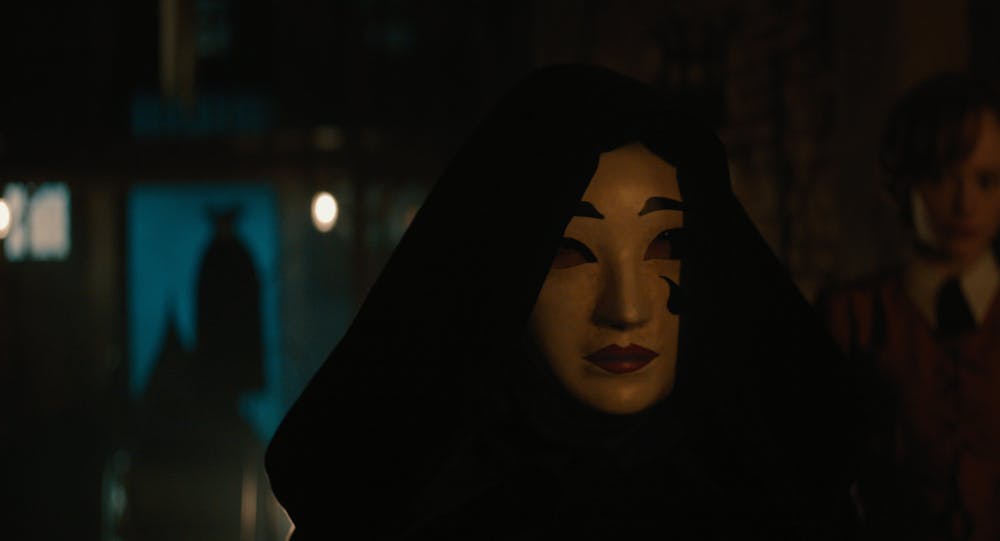Kenneth Branagh’s newest Agatha Christie adaptation, “A Haunting in Venice,” is a thrilling tale that will keep audiences guessing until the very end. Set against the grim backdrop of post-World War II Italy, the film plays with ideas of darkness and light.
These conflicting ideas are symbolized by the song “When the Lights Come On Again,” heard repeatedly throughout the film. It seems out of place at first, but provides a fitting sense of eeriness for the world the famous detective Hercule Poirot, the main character of 33 of Christie’s novels, finds himself in while also encapsulating the hope that drives the characters.
The movie opens with a very different Poirot – played by Branagh – than viewers are expecting, one who has walled himself off into a life of eating pastries and fending off any potential clients with unsolved cases. Only a visit from famous author Ariadne Oliver — played by Tina Fey at her snarkiest — begging him to investigate the alleged medium Joyce Reynolds can convince him to rejoin the world of the living.
The divide between the living and dead permeates every inch of the movie, with vengeful spirits seemingly filling the home of Kelly Reilly’s character Rowena Drake, where a séance will take place. Many centuries ago, this house was an orphanage where children were left to die. Now, their spirits seek fellow children to join them. It appears Drake’s daughter, Alicia, was the latest victim — but was this suicide or murder?
Unlike Branagh’s first two Agatha Christie adaptations, “Murder on the Orient Express” and “Death on the Nile”, “A Haunting in Venice” distinguishes itself from its inspiration: Christie’s novel titled "Hallowe'en Party.” While preserving the setting of the film and some significant plot points, Branagh and screenwriter Michael Green craft a tense piece which examines the very heart of humanity.
“A Haunting in Venice” departs from Christie's typical story model in which Poirot interviews each character, thinks for twenty minutes, and suddenly finds the solution. The characters mock this idea, with Oliver observing that Poirot acts as if he knows more than everyone else when he does not.
Oliver kept me interested throughout the film. She resembles a version of Agatha Christie, even having a first name beginning with the letter “A.” More importantly, both are female mystery novelists with famous foreign detectives as main characters. Oliver even comments that her novels’ character is a thinly veiled Poirot.
I found the concept of a book within a book fascinating. Does Oliver’s detective lead also have a female mystery novelist assisting him through the case? What is the line between fiction and reality?
Unlike in “Hallowe’en Party,” however, Oliver is not well-liked, famous or above suspicion. She begins the movie with a less than stellar literary reputation, but she hopes to find something phenomenal to write about so she can rise to the top again. Darkness and cynicism color this downward spiral, allowing the audience to see a very different Ariadne Oliver, one who, unlike in the original novel, is very much under suspicion.
Much in the spirit of the times, the whole world is under suspicion. Branagh utilizes odd camera angles, splicing them together in an unexpected order to portray a world gone mad.
Meanwhile, the specter of World War II haunts the story, almost like a ghost itself. This is especially the case through the example of Jamie Dornan's character Dr. Leslie Ferrier. Through his battle with Post Traumatic Stress Disorder, acquired when liberating Bergen-Belsen, he gives a voice to the struggling World War II veterans and shows the dignity of those who survived.
Just as the song suggests, the lights come on again – but not before body bags are needed. The somber ending shows just what humanity is capable of. If there are no ghosts, are we truly the barbarous ones? And for a moment, Branagh has even the most devout Christie fans wondering if there is no human murderer, but if the darkness that rules inside of us had, on the darkest of Halloween nights, finally come out to play.




